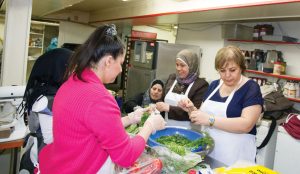Newcomer Kitchen a welcome taste of home
By Geremy Bordonaro
Imagine that you have been stuck in a hotel room. You were thrown from the comforts of your own home and now find yourself in an unfamiliar land. Nothing looks the same. No one speaks the same language. All you have is you and your family crammed into a small hotel room without utilities.
This was reality for many Syrian refugees once they arrived in Canada, while waiting for clearance to get to their sponsors.

PHOTO BY GEREMY BORDONARO: In the first Annex Newcomer Kitchen event, Syrian women make maqlooba with fattoush in Butler’s Pantry. Organizers hope the initiative will spread to other parts of the city.
For Len Senater, owner of Depanneur on College Street, this simply would not do. So he launched Newcomer Kitchen, a deceptively simple plan that helps the city’s newest citizens cook a good meal for their families, but also gives pointers to those interested in a career as a restaurateur.
“We were hearing more and more about the families stuck in the hotels. It became clear that those families had no access to kitchens at all to cook for themselves or their families,” said Senater. “I have this large kitchen and I have a venue…that is not being used during the day. Why not invite these families to come so that they can cook food for themselves and for their family.”
Senater hasn’t gone without some help in his mission. Len recruited a friend, Atique Azad, owner of Butler’s Pantry in Mirvish Village.
“[Azad] has been a friend and a mentor to my project for many years. He has much more experience in the restaurant business than I do. I knew that he and his wife spoke some Arabic and were interested in some humanitarian issues,” Senater said, adding that Azad volunteered immediately upon hearing of the initiative. Newcomer Kitchen also gained traction on social media, finding sponsors, and attracted the involvement of the Arab Community Centre.
Senater explained that Newcomer Kitchen gives people who have lost so much the opportunity to regain the most basic of home comforts.
“I met one woman who was an X-ray technician back at home,” said Cara Benjamin-Pace, a Newcomer Kitchen assistant. “She hadn’t cooked in a long time but when she picked up an onion and a knife, it came back to her instantly. She was back home.”
As others mingled preparing maqlooba with fattoush, it became clear that, for them, there was more to cooking than just the nourishment.
“It’s about the act of cooking, the act of feeding, and it’s clear to me when inviting these people here that cooking is not a solitary activity in Syrian culture,” Senater said. “It’s a community building activity, something done together with friends and family.”
It’s also a reminder of normalcy, of skills that haven’t been lost.
“Imagine that there’s one thing that you’re really good at, that people are relying on you to do, and you don’t have a chance to do that one thing,” he said. “When somebody comes and gives you a chance to do it, that’s got to feel good.”
Though most refugees are now on their way out of the hotels, the Depanneur will still continue to host Newcomer Kitchen, and Senater hopes the program will inspire other kitchens, whether they’re commercial or residential, to launch similar initiatives for refugees.
“[Longevity] is a driving force,” said Azad. “For a project like this, it’s important to keep the future of it in mind.”
READ MORE:
NEWS: A warm welcome for new arrivals (January 2016)
EDITORIAL (DECEMBER 2015): Embrace Refugees
